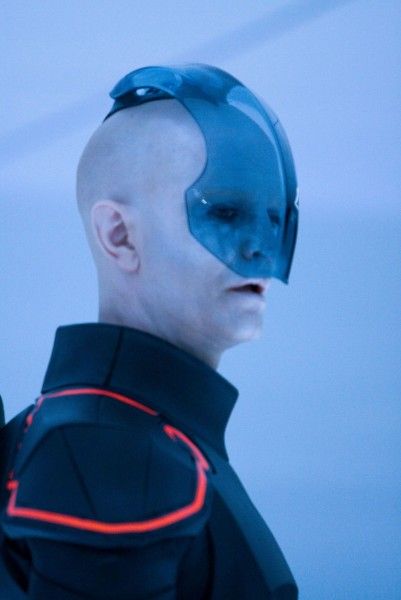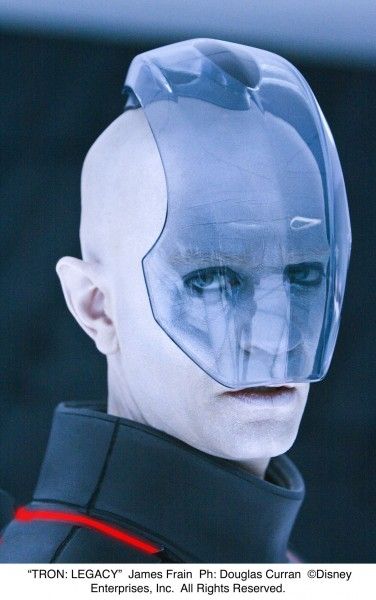The big bad in Tron: Legacy is Clu, a master program created in Kevin Flynn’s (Jeff Bridges) image to help oversee the expansion of the digital domain, but who has gone rogue and seized control of the Grid and its inhabitants. And, since every big bad needs assistance in carrying out their evil, nefarious plan, Clu has a main henchman and chief intelligence officer named Jarvis (James Frain), a program proficient in intelligence-gathering.
In this recent exclusive interview with Collider, actor James Frain talked about how surprised he was to see how much of the film he’s actually in, how much he enjoyed working with director Joseph Kosinski and that he would love to work with him again, how he wishes he could have kept Jarvis’ helmet to display in his own living room, and how playing the villain can be really fun. He also shared some details about what viewers can expect from the much-hyped NBC superhero drama The Cape (premiering on January 9, 2011), in which he plays the fun-loving billionaire Peter Fleming, who also happens to moonlight as the psychotic killer Chess. Check out what he had to say after the jump.
Now that you’ve finally had a chance to see Tron: Legacy, how did it most surprise you and in what ways did it exceed your expectations?
JAMES FRAIN: I was surprised by how much of it I was in. I thought the character was just going to register as a smaller figure because most of what I did was with a body double, and then I would do the stand-in with Jeff [Bridges] and he would be just wearing his regular clothes. They had this special kind of head rig that they put on for that, for the Benjamin Button effect. But, it seemed very casual and there always seemed to be not that many people there. Even the scene that I do, where I’m addressing this vast crowd of thousands of programs, that was just me, on my own, with a couple of people in the background and a big blue screen. So, it was quite startling to see myself in the world that I had imagined, but didn’t really know what it was going to look like. I was amazed by that.
I also thought the music was a huge contribution, in terms of creating the scale of that. And, I was impressed with just how natural and fluid the world looks. The world is so artificial and it requires so much work to make all the different pieces add up together, but when it comes together, it just looks effortless. It’s amazing. The costumes, the light rigs and the effects are seamlessly joined. I’m kind of bummed that I don’t get the experience that you get with just watching it cold. By the time we’d seen all the visuals put together, I’d sort of become used to that world. It’s still pretty impressive.
Was there a point where you realized that you were a part of something that held so much interest for so many people, or had you always been aware that this was going to be as big as it is?
FRAIN: You know, what I didn’t know was how many people in the tech world the original movie had such an impression on. That’s really interesting to me because a lot of the people who created this technological revolution that we’re all living through were kids when Tron came out, and they saw Tron and it impacted them. That was one of the things I hadn’t really put together. Since the first movie and this movie, the rest of us have been living that revolution, largely engineered by people who were Tron fans. That’s pretty deep, man.
Looking back, what will you remember most fondly from having been a part of this entire experience?
FRAIN: Working with Joe [Kosinski], definitely. I loved working with Joe. For a guy who doesn’t really come from the fiction world – he comes from advertising and architecture – he’s extremely easy-going and very calm. He’s extremely detailed, but a very generous and fun director to work with. He really encouraged me to find the fun in the part and to have fun with it. For all that Tron wanted to be, it ultimately had to be a fun ride for the audience and I was going to be one of the comic characters, and he was really on top of that. He was having such a good time doing it. That’s my memory of it. I’d love to work with him again. I think he’s great.
Did you get to take anything home from the set, as a keepsake or a memento? Would you have liked to have kept Jarvis’ helmet, or were you happy to never have to put that on again?
FRAIN: Oh, both. I would want to keep that in a little glass sphere, perhaps in the corner of my living room, lit up. But, I think that’s an extremely expensive rig. The costumes were crazy expensive, beyond anything they could afford to give you, to take away. They’re going to be in a museum of some kind, on display until they get the go for Tron: Legacy 2. It would have been awesome to keep, though. I don’t think there was anything that they could afford to let go. I probably would have been arrested.
Since you’ve done it a few times recently, in playing villains, do you prefer to play characters who quite enjoy the evil that they’re doing, as opposed to being angsty about it?
FRAIN: I don’t know. There’s no hard and fast rule. Evil is a broad church. There are so many different ways to be evil. Sometimes it’s fun to be the guy who doesn’t know that he’s bad, like the character I played in True Blood. He was pretty angsty about it, but he thought he was doing the right thing. And sometimes it’s fun to be the guy who just really enjoys it, like the guy I’m playing now on The Cape. He’s more that. He’s much more flashy and debonaire and devil may care-ish. He just loves doing bad in the world. That’s real fun to do.
Is there a specific moment or cause that makes your character on The Cape act the way that he does?
FRAIN: We haven’t put together a very specific backstory. It’s all up for grabs right now. There’s a lot of big storytelling on The Cape, and there’s a lot of things that they’re throwing up in the air, to come back to in later episodes. It’s very open. What happens is that, in doing a show like this, you find out who the character is as they write it, and they’re finding out as well. It’s an ongoing thing. I have my own sense of who he is. I don’t think people who behave this way come from very loving families. But, I’m not bogged down in that, necessarily.
What can you say about the show and how your character fits into the story? How is this superhero show different from others?
FRAIN: I’m not particularly an expert on the genre. Correct me if I’m wrong, but usually you see most of the super-villain in his villainous role. He’s the Green Goblin, or whatever various bad guys in Batman, or something like that. It’s the excessive, larger than life, cartoon-ish, costumed character that is the personification of evil and has to be destroyed. With my guy, every now and then, he puts on a mask and does that, but he isn’t that. Most of the time that we see him, he isn’t that. Most of the time that we see him, he’s fun to hang around with. I think that’s unusual, to that extent.
There’s something attractive about my character. He’s fun-loving. You can almost think, “Well, maybe he isn’t a bad guy, after all. Maybe he does a few things that are bad, but maybe he could learn his lesson.” But then, he has this unfortunate habit of dressing up as this crazy character and being completely psychotic. That is unfortunate, and I think he’s probably not going to be able to kick that habit. What’s fun in The Cape is that I think they’re going to explore – with both the lead hero and with the bad guy – this idea that, once you start donning a disguise, whatever that means, what is that going to do to you and how much are you going to be in control of it, or is it going to be in control of you, and is that a crazy thing to be doing anyway. They’re doing that. They’re having fun with it and staying in the genre, but they’re going to explore what that is.
Does Chess always wear the contacts with the chess pieces when he’s in bad guy mode? Is there a reason for him doing that?
FRAIN: I don’t know. We’ve not really pinned down where they come from or how that happens, but every time you see him as this bad guy Chess, he does have these chess contacts in, which is very effective at freaking you out.
What’s it like to be on a show that’s so heavily promoted? Do you worry about living up to the hype?
FRAIN: I think this is a big show, an expensive show and an ambitious show, and it has to launch big, and we have to go for it, as much as possible, so I think they’re doing the right thing.



